555 Minutes: Learner Centered Conferences
When you think back to your middle school experience, how often did you sit one on one with your teachers? I struggle to recall a single one-on-one interaction with a teacher lasting longer than a minute or two...except when I got kicked out of class! At Embark Education, sixth graders will spend nearly six hours one-on-one with me over the course of the year, at minimum. This is a substantial investment in time, but I can assure you the results are highly impactful. We forge trusting relationships and get to know each other on a personal level. Together, we unpack their successes, the challenges, and sit side by side as partners in learning. Students leave with next steps and strategies, and they each have that special feeling of being seen, heard, and valued as an individual.
The Structure of a Conference
Today I hosted four individual conferences and they all began with the same simple question. “How are you?” After the 17th conference (yes we are 17 weeks into the school year), students understand that a one word answer will not suffice. In fact, recently students made fun of my questioning by mocking my follow-up prompt, “Say more about that.” This initial question is the heart of the conference which is about reflection, relationship building, and listening. In our society, we understand that we are supposed to answer, “Good or fine”, but a conference creates a space for, “Sad, nervous, excited, frustrated…”. If they are willing, and they usually are, they can share their thoughts with a trusted adult which only deepens our relationship. Over time, I am able to build trust with even the most skeptical or resistant students.
Once we have made space for students to express their feelings, the next piece of the conference is to ask about the prior week’s goals. Usually, I will say, “Last week we discussed________, and you said you would _________.” For example, “Last week we discussed prioritizing challenging work, and you said you would work on your math assignment on Monday.” This piece of the conference addresses a few important ideas. For one, it reinforces the fact that I have listened to them and that they are important. Second, it serves as a space for accountability and ideally celebration. Almost immediately a student will show you which with their facial expression. I have seen so many sets of eyes light up as they realize that they did accomplish their goals. This becomes particularly powerful when they decide to continue an effective practice of their own accord. Equally important is helping students to identify what barriers they faced if they did not meet their goal.
Many times, these two pieces will take up the entire conference, if not, we move on to looking ahead. I typically ask, “What challenges are you facing this week and how can I support you?” This question drives at two of Embark’s competencies, Agency and Reflection. Once students can identify challenges, they need to have the growth mindset and self-management necessary to face them. During this piece of the conference, we really dive deep into strategizing. If the challenge is collaborating with a peer, I love to role play with students to help them plan for and practice interactions they find challenging. If the challenge is work completion, we can collaboratively make a plan and set deadlines. The goal is to ensure that students feel empowered and efficacious as they confront whatever stands in their way.
The conference always wraps up with students summarizing what they heard and repeating their next steps. They leave the conference exhibiting confidence, self-assuredness, and a plan. I leave the conference attuned to each individual and better able to support them along their journey.
Each school and situation is unique, and it may not be possible to find 555 minutes for each student. At the same time, the time spent one on one with students in conferences has the ability to dynamically impact their futures and your relationship. Don’t let the only memorable one-on-one moments be when a student is kicked out of class like they are for me, invest proactively in conferences.

